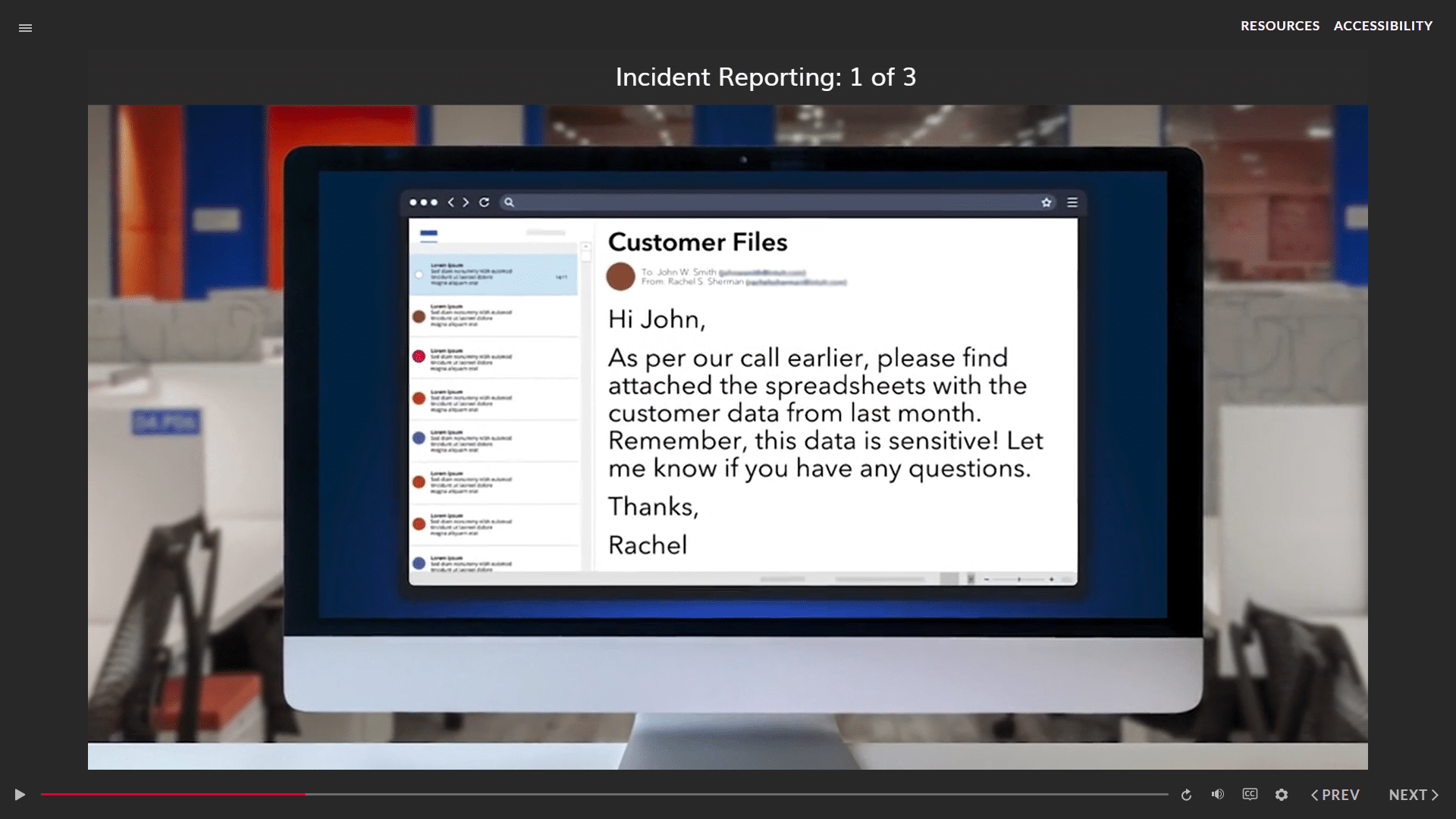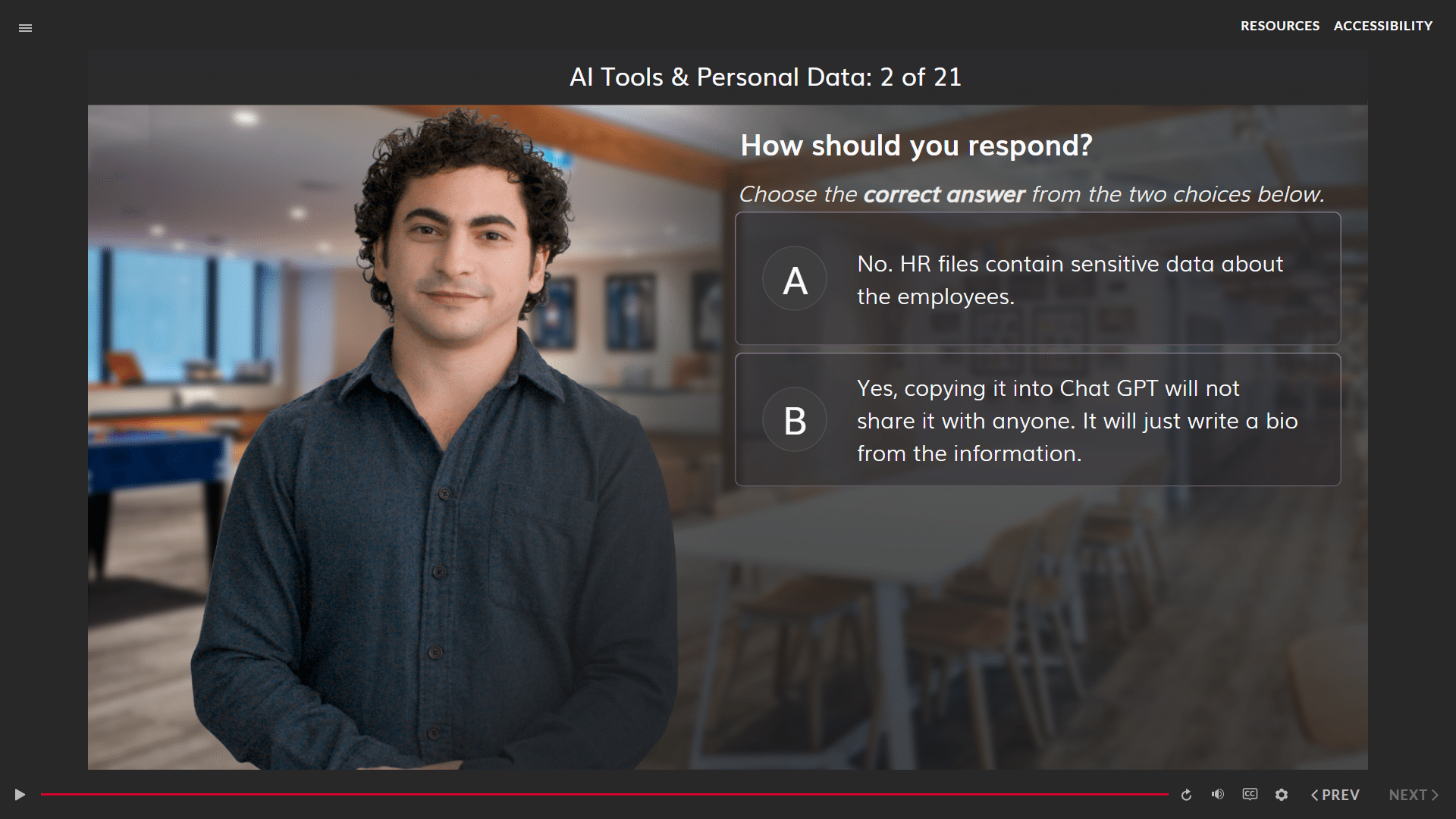
Data Privacy and Security Training
Empower your employees to address privacy concerns and reduce the likelihood of data breaches or compliance violations.
Course description
Traliant’s Global Data Privacy Awareness training is a 40-minute that introduces employees to key data privacy principles. The training covers US state-based data privacy laws, sector-specific privacy laws at a US federal level and comprehensive data privacy laws on a national scale across the globe.
ONLINE TRAINING
Data Privacy and Information Security Training

The course covers these topics and more:
- Data privacy terminology, as various laws (GDPR, CCPA, HIPAA) describe elements of data privacy differently and have nuances in their definition.
- Data subject rights
- Data use principles
- Data privacy laws
- Recognizing and reporting incidents
- Intersection of AI tool use and data privacy
THE TRALIANT DIFFERENCE
Compliance you can trust.
Training you will love.

Legal expertise
Our in-house legal team monitors the latest laws, rules and regulations, so you don't have to. You can rest assured that our courses are continuously compliant.

Brilliant training
Take your training from boring to brilliant. With cinematic-quality videos produced by our Hollywood-based team, your employees will love our customizable, interactive, story-based training.

Valued partnership
Our main focus? It’s all about making your job easier. We do that with unmatched responsiveness and seamless deployment, dedicated to driving your success.

Meaningful impact
We don’t just deliver brilliant training, we help you create meaningful impact by broadening your employees' perspectives, achieving compliance and elevating culture.
KEY FEATURES
Why you'll love our training
It’s time to embrace a new era of online training with a valued partner who will ensure seamless implementation to fit your exact, a truly enjoyable learning experience and courses with continuous compliance you can trust.
Compliance expertise
Traliant's in-house legal expertise ensures training is accurate and kept up-to-date with any regulatory changes.
Accessible to users with disabilities
Traliant provides an inclusive experience for all users, including those with disabilities, by going beyond Section 508-C standards and offering WCAG 2.1/2.2 AA.
Story-based learning
Our story-based approach blends leading instructional design with Hollywood talent to produce engaging, interactive and nuanced training.
Course administration
Traliant makes it simple to roll out training to your workplace and provide technical support directly to your employees at no additional cost.
Course customizations
Tailor courses to include your logo, relevant policies, workplace images, and more. Traliant can even customize the course with scenarios that take place in your own workplace environment.
Translations
Training is available in English, Spanish and is supported in over 100 languages.
COMPLIANCE EXPERTISE
Your partner in training compliance

Uniquely qualified in-house compliance team
Our exceptional in-house Compliance Advisory Team is led by Michael Johnson, Chief Strategy Officer and former U.S. Department of Justice attorney who has provided training and guidance to organizations like the Equal Employment Opportunity Commission, Google, the United Nations, and the World Bank.

Keeping you compliant, effortlessly
Keeping up with the complex web of employment laws — especially if your workforce spans multiple states — can be tricky. That’s why we offer a streamlined training solution that ensures you stay compliant with federal, state, and local regulations, so you can focus on what matters most: your team.

Simplifying your policies and handbooks
Crafting an employee handbook that meets legal standards can be daunting. Let us ease the burden. We help you navigate regulatory changes to ensure your policies and handbooks not only comply with the law but also reflect industry best practices.
What to consider when choosing the most effective Data Privacy training

- Minimize legal and financial risks: Data breaches can result in costly fines, lawsuits, and damage to a company's reputation. Training helps organizations to comply with data privacy laws and to protect themselves from these risks.
- Promote a culture of data protection: Training helps to create a culture where employees understand the importance of protecting sensitive data and to follow best practices for handling and storing this information.
- Build trust with customers and stakeholders: Data privacy is becoming increasingly important to customers and stakeholders. Training helps organizations to demonstrate their commitment to responsible data handling.
- Empower employees: Training provides employees with the knowledge they need to understand the company's data privacy policies and to make informed decisions about how to handle sensitive data.
- Strengthen your organization's security posture: Training helps to build a strong security culture, making it more difficult for cybercriminals to succeed.
- Reduce the risk of costly data breaches: Data breaches can have a significant financial and reputational impact on organizations. Training can help to minimize these risks.
- Notice: Organizations should provide clear notice about how they are collecting, using, and sharing personal information.
- Choice: Individuals should have control over their personal information and the ability to make choices about how their data is used.
- Access: Individuals should have the right to access their personal information and to make corrections if it is inaccurate.
- Security: Organizations should take reasonable steps to protect personal information from unauthorized access, use, or disclosure.
- The General Data Protection Regulation (GDPR): This law, enacted by the European Union, is a comprehensive data privacy law that applies to organizations that collect personal data of individuals located in the EU, regardless of where the organization is located.
- The California Consumer Privacy Act (CCPA): This law gives California residents certain rights regarding their personal information.
- The Health Insurance Portability and Accountability Act (HIPAA): This law protects the privacy of individually identifiable health information.
- Follow company policies: Be aware of the company's data privacy and security policies, and follow them carefully.
- Use strong passwords: Create complex passwords and don't reuse them across different accounts.
- Be cautious about phishing attacks: Be wary of emails and messages that ask for personal information or contain suspicious links.
- Protect your devices: Use strong passwords and encryption for your devices, and report any suspicious activity immediately.
- Be aware of the data you're handling: Understand what types of data you are working with and the level of sensitivity.
- Limit access: Only give access to sensitive data to authorized individuals who need it to do their jobs.
- Don't share sensitive information via email or other unsecured methods: Use secure file transfer methods when sharing sensitive data.
- Secure your devices: Ensure that your devices are password-protected and that you have security software installed.
- Report any suspicious activity: If you see something suspicious, report it immediately.





